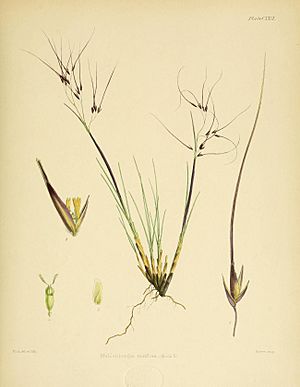Ortachne facts for kids
Quick facts for kids Ortachne |
|
|---|---|
 |
|
| Ortachne from Plate CXXXI of Hooker's Flora Anatarctica. | |
| Scientific classification |
|
| Kingdom: | Plantae |
| Clade: | Tracheophytes |
| Clade: | Angiosperms |
| Clade: | Monocots |
| Clade: | Commelinids |
| Order: | Poales |
| Family: | Poaceae |
| Subfamily: | Pooideae |
| Supertribe: | Stipodae |
| Tribe: | Stipeae |
| Genus: | Ortachne Nees ex Steud. |
| Type species | |
| Ortachne rariflora Nees ex Steud.
|
|
| Synonyms | |
|
Parodiella Reeder & C.Reeder 1968, illegitimate homonym not Speg. 1880 (a fungus in Pyrenomycetes) |
|
Ortachne is a small group of plants that belong to the grass family. These grasses are mostly found in Latin America, especially in countries like Chile and Argentina. Just like other grasses, Ortachne plants are important parts of their ecosystems.
What is the Ortachne Genus?
A genus is a group of closely related living things, like different types of cats or different types of roses. The Ortachne genus includes a few specific kinds of grasses. Scientists study these plants to understand how they grow, where they live, and how they are related to other plants.
Types of Ortachne Grasses
Currently, there are two main types of Ortachne grasses that scientists recognize:
- Ortachne breviseta - This type of grass is found in Chile and Argentina.
- Ortachne rariflora - This is another type of Ortachne grass, also found in Chile and Argentina.
How Plant Names Change
Sometimes, scientists change the names of plants or move them to different groups. This happens when they learn new things about how plants are related. For example, some plants that were once called Ortachne are now known by different names. This helps scientists keep plant classifications accurate as new discoveries are made.
See also

- In Spanish: Ortachne para niños

